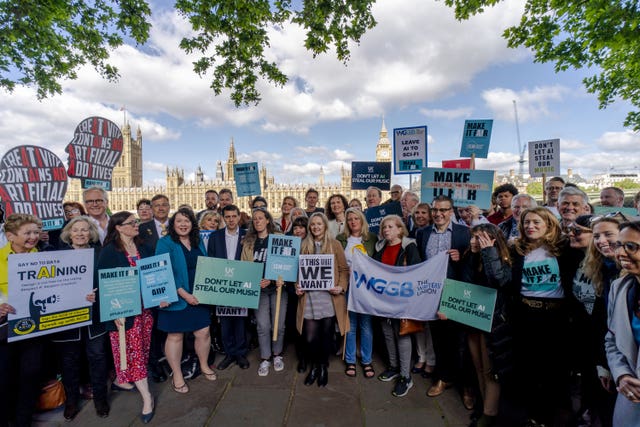
Iain Dale 7pm - 10pm
7 May 2025, 21:14

The Government pledged to conduct an economic impact assessment of the policy options put forward in its copyright and AI consultation.
The Government’s data reforms have moved closer to becoming law as ministers faced calls to do more to “protect artists” from artificial intelligence (AI) developers.
The Data (Use and Access) Bill cleared the House of Commons on Wednesday evening, with the Government successfully resisting proposals by critics of the legislation to include changes relating to AI and copyright.
Peers previously amended the Bill in a bid to protect creatives from having their copyrighted work used to train AI models without permission or remuneration, although these changes were removed by the Government during the committee stage of the legislation in the Commons.

Opposition MPs failed to reinstate the protections on Wednesday as the Government argued the amendments pre-empted the results of its copyright and AI consultation and it does not want to legislate in a “piecemeal” fashion.
Instead, the Government pledged to conduct an economic impact assessment of the policy options put forward in its consultation.
The consultation has been widely condemned by high-profile figures in the creative sector, including musicians such as Sir Elton John, Annie Lennox, Sir Paul McCartney and Kate Bush, who say the Government’s plans to make it easier for AI models to be trained on copyrighted material amount to the theft of music and will decimate the sector.
The Commons exchanges came after creatives, industry leaders and politicians gathered in central London to call on the Government to scrap plans that would allow AI developers to use creative content without permission or payment.
Speaking in the Commons, technology minister Sir Chris Bryant said the creative industries should be “remunerated for the work that they have produced” and copyright law will remain “robust and clear”.
He said “there is a text and data mining exception already in UK law”, adding: “That is a text and data mining exception for the sole purpose of research for a non-commercial purpose. I think that is absolutely clear in law, and I don’t think it needs any clarifying.”
Intervening, Labour MP Stella Creasy (Walthamstow) said: “The Government did open a consultation that has, for many of our constituents who work in the creative industries, prefigured a substantial change in copyright when it comes to AI.”
She added that the creative industries being able to benefit from and protect their own work is “what is at stake here”.
Sir Chris replied: “I share the concerns, namely that we wanted to make sure, in this very fast changing world, that the creative industries in the UK are able to be remunerated for the work that they have produced, we’re not in the business of giving away other people’s work to a third party for nothing.”
He added: “The only circumstance in which we would advance with the package of measures that were included in the consultation is if we were to believe that we were advancing the cause of the creative industries in the UK, rather than providing danger or legal peril to them.”
Labour MP Alison Hume, a Royal Television Society writer of the year award winner, urged tech firms to “tell us what they are doing behind our backs, and pay up”.
The MP for Scarborough and Whitby, who won the award in 2008 for her work on CBBC’s Summerhill, said: “At the moment, AI companies do not have to tell anyone what they’re stealing from the internet, from whom they are stealing and why they are stealing it.”
Ms Hume said she understood the Government “wants more time”, but added: “I worry that in the gap between this data Bill becoming law and a new Bill which addresses transparency in copyright, everything that can be scraped will be scraped.”
She later added: “Necessity is the mother of invention, and without a legal instruction for AI companies to reveal what they are using free of charge, there’s surely no incentive for the AI industry to come up with the solutions to make it simple for original creators and collecting societies to assert their rights.”
Giles Martin, a Grammy-winning English record producer and son of Beatles producer George Martin, said ahead of the debate: “The Government seem to be more and more influenced by large technology companies, seem more impressed by them.

“(If) Paul McCartney today writes Yesterday, that should belong to him, or he should just say what happens to that, or his voice. He should say what happens to his voice and right now, with the Government, they’re not doing enough to protect artists.
“If you make something, if something is yours, it shouldn’t be taken by a company and used without your permission. It’s as simple as that.”
UK Music claims the Bill would put creatives at risk after amendments put forward by Baroness Kidron to ensure transparency and international compliance safeguards were removed.
The protest saw industry leaders and creatives call on the Government to make changes to the Bill to ensure that companies training generative AI models, such as ChatGPT, disclose whether work by a human creator has been used and protect creatives under existing copyright rules.
A Government spokesperson said: “Currently, creatives are not being fairly compensated for their content and only the largest rights holders have the power to effectively assert their rights.
“We want to enhance their ability to be paid for the use of their material. UK AI developers also face greater innovation barriers than their international competitors, pushing AI innovation overseas.
“The Government’s objectives are to deliver a solution which will ensure increased control and transparency for rights holders and access to high-quality material to train leading AI models in the UK.”